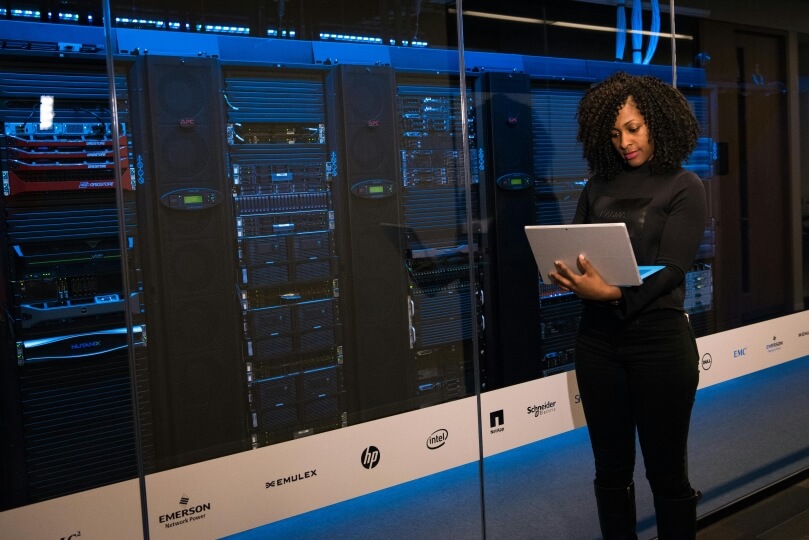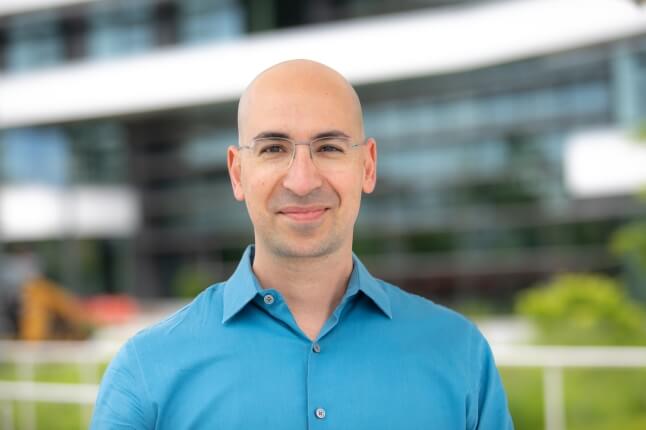Table of Contents
- What Is a Data Scientist?
- What does a data scientist do?
- Necessary skills for a data scientist
- Becoming a Data Scientist
- Conclusion
Many people, some even in professional settings, choose to rely on instincts when making decisions. Although there are certainly moments when one's gut feeling can be right, we live in a world surrounded by data—where every online search, social media post, and digital interaction generates new information. In this context, it's far wiser to base decisions on evidence rather than intuition.
This is what data science is all about: using data to make informed choices in everything, making it a promising and highly relevant career choice. So, for anyone interested in pursuing it, the first order of business is to have a clear idea of how to become a data scientist—understanding the skills, training, and experiences needed to succeed in this role.
To become a data scientist, you should:
- Build a strong educational foundation – A bachelor's degree in data science, computer science, statistics, or applied math is a solid starting point. Alternatively, online courses and bootcamps can help introduce you to the field.
- Master core data science skills – Including, but not limited to, programming, statistics, machine learning, skills in data wrangling and visualization, as well as soft skills like communication, collaboration, and critical thinking.
- Gain practical experience – Use internships, personal projects, or competitions to gather examples that showcase your ability to apply your skills effectively.
- Keep learning – Stay up-to-date with new advancements, engage with data science communities, and keep pushing yourself to learn and grow.
What Is a Data Scientist?
A data scientist is an expert who combines statistical analysis, computational skills, and domain knowledge in order to derive insights from data and assist decision-making. They are often said to be between statistics and computer science as they have a deeper understanding of statistics than a computer scientist and more programming expertise than a statistician.
Data scientists are versatile professionals—capable of applying their skills to various industries. Actually, data science encompasses a range of specialized roles that focus on different aspects of working with data. Some of them focus on building machine learning models that predict customer behavior or streamline operations. Others, such as data analysts, are concerned with deciphering trends and extracting insights from datasets. On the infrastructure side, data engineers work to ensure that data flows smoothly through pipelines and is stored efficiently.
At Harvard SEAS (School of Engineering and Applied Sciences), students are encouraged to explore how data science can be applied to solve pressing issues across different domains by tailoring their learning with courses in the industries they're interested in.
What does a data scientist do?
Have you noticed how, when you're shopping online or scrolling through streaming services, you often receive personalized recommendations? These suggestions aren't just coincidental; they're generated from machine learning models built by data scientists, who analyze your viewing habits, preferences, and even the time of day you watch in order to provide the most relevant recommendations.
Data wrangling and building statistical models are just some of the many duties of a data scientist. Their work typically begins with acquiring and cleaning data. This is a foundational step necessary to guarantee that the analyses performed after are based on relevant and reliable information.
They also employ exploratory data analysis in order to uncover trends, patterns, and insights that might be hidden in the data. Once the data is prepped and thoroughly explored, then they can build and test predictive models that address specific problems or provide insights into future trends.
In addition, data scientists are often tasked with visualizing their findings through graphs, charts, or interactive dashboards.
Learn about Harvard's Data Science Masters program
Necessary skills for a data scientist
In order for data scientists to fulfill their responsibilities on the job, they need to master a set of skills and knowledge which include:
- Proficiency in relevant programming languages
- Ability to analyze and visualize data
- Expertise in machine learning
- Knowledge of big data technologies
- Soft skills for effective communication and teamwork
Becoming a Data Scientist
In order to become a data scientist, there are a few steps you must go through in order to be prepared for the role. The exact path can change depending on personal circumstances; however, it typically encompasses the following:
1. Start with a strong educational foundation
A strong educational background is highly recommended for becoming a data scientist. Whether you're in high school or college or looking to make a career change, there are several degree and program options for gaining the required knowledge.
Formal education
Typically, data scientists are required to hold at least a bachelor's degree in data science, computer science, statistics, or another related field. Harvard SEAS, for example, offers undergraduate and graduate programs in Computer Science, Applied Mathematics, and Engineering Sciences, which are ideal starting points for this career.
Graduate programs, such as Harvard's Master's in Data Science, then provide advanced training and opportunities for specialization—skills that are highly valued by employers and sometimes even required.
If you already have a college degree in a related field, a specialized master's program is an excellent choice to deepen your skills. However, if your degree is not directly related to data science, you can still make the switch through courses in programming, statistics, and data analysis.
Alternative education
Although formal education is the option we recommend, it's worth noting that not everyone follows this traditional educational path. There are successful data scientists who have not completed a degree but were self-taught or developed their knowledge and skills through other programs.
Therefore, it's not uncommon for people to opt for online courses or bootcamps in order to gain specific skills. There are various platforms that help aspiring data scientists learn programming languages, machine learning, and data analysis.
However, keep in mind that many self-education options in data science tend to focus heavily on trends and the latest popular tools. Although it's beneficial to be informed about what is currently popular, it's not wise to begin with that and bypass the foundational knowledge and skills of the field—something formal education emphasizes. Without a solid grasp of the core principles, it can be challenging to adapt when other new technologies and methods inevitably emerge.
Formal education will equip you not just with trendy skills but with the versatility and adaptability needed to build upon, refine, and expand them throughout your career.
Learn about the Master's in Data Science at Harvard
2. Develop core data science skills
Mastering the aforementioned core data science skills is necessary to put theory into practice. Aspiring data scientists must be particularly focused on the following:
Programming and technical skills
You should first seek to learn programming languages and how to best use them for analyzing data, building models, and managing databases. Some of the most popular programming languages are Python, R, and SQL.
Python is quite versatile and, therefore, suitable for tasks ranging from data cleaning to advanced machine learning, while R offers powerful tools for statistical analysis. SQL is typically used to manage and query large databases, enabling data scientists to access and extract data.
Understanding statistics and mathematics is also important, as they form the basis of data analysis and machine learning.
Formal degree programs typically cover the most essential programming and technical skills. Alternatively, if you're looking to focus on a specific skill, you can take individual courses that specialize in that area.
Some options available at Harvard include:
- CS50: Introduction to Computer Science
- CS50's Introduction to Programming with Scratch
- CS50's Introduction to Artificial Intelligence with Python
- CS50's Introduction to Programming with Python
- CS50's Introduction to Databases with SQL
- Machine Learning and AI with Python
- Data Science: R Basics
- Data Science: Machine Learning
- Data Science: Productivity Tools
Data wrangling and visualization
Data must go through several processes in order for data scientists to be able to extract insights from it. Therefore, you must work on your data wrangling skills, which essentially entail the cleaning, structuring, and transforming of the initial data into a more suitable format for analysis.
Additionally, presenting data clearly through visualizations is crucial for ensuring that other professionals understand your insights. Visualizing the results makes it easier for others to act on the information provided.
Some courses you can follow to develop these skills include:
Developing domain knowledge
Understanding the industry you're working in is also crucial. Whether it's healthcare, finance, or government, having domain knowledge helps you in applying data science to specific areas. Harvard's interdisciplinary approach allows students to gain the expertise they need to tackle industry-specific challenges.
Some Harvard courses you can seek to help you develop your knowledge in applying data science for a specific domain include:
- Data Science: Data Science Principles
- Data Science: Data Science for Business
- Big Data for Social Good
3. Gain practical experience
The experience you gain in data science will be proof of your ability to transform theoretical knowledge into action and demonstrate the skills you've developed. Although much of it will come from on-the-job learning, it's still important to start building experience early to lay a solid foundation.
In fact, experience is another key reason why formal degrees are so valuable for this career path. The projects, coursework, and assignments you complete during the program serve as practical examples to showcase your skills to potential employers when applying for jobs. Some other ways to gain practical experience are:
Internships
Internships are a great way for aspiring data scientists to gain hands-on experience. Working alongside professionals in the field enables interns to see how data science projects are approached in an organizational context.
Internships also provide opportunities to begin building a professional network. You can connect with mentors and peers who can offer guidance, support, and potentially lead to future job opportunities.
Harvard's Mignon Center for Career Success serves as a comprehensive resource hub for students, offering support with internships, career development, and job placement. Through online platforms, personalized advising, and career-focused events, the center helps students explore opportunities and achieve their professional goals.
Personal projects
Personal projects are another excellent way to showcase both your technical skills and creativity. Whether it's building a predictive model for a dataset you find interesting, creating a data visualization dashboard on a topic you're passionate about, or scraping data to explore a specific question, these projects give you the chance to experiment and learn outside of formal education.
Hackathons and competitions
Participating in hackathons and data science competitions allows you to gain experience in dealing with real problems in a fast-paced, practical environment, which makes the experience both challenging and rewarding.
These events help you sharpen your problem-solving abilities while working under time constraints, mirroring the kind of pressure you might face in a professional setting. Hackathons also encourage teamwork and creativity, helping you build both technical and soft skills valued by employers.
4. Stay engaged and keep learning
Because data science, like technology in general, is constantly evolving, it's important, especially for long-term success, to stay engaged and always strive to learn more. This will guarantee that your skillset is relevant to the job market and that you are informed about new technologies and methods in the field.
Advanced specializations in data science
Data science is a vast field connected to many areas and applications. Once you've mastered the basics, advancing in the field often involves focusing on more specialized topics. For example, you might explore advanced research areas like natural language processing (NLP), computer vision, or artificial intelligence (AI).
At Harvard SEAS, students have access to coursework and research opportunities in emerging areas like AI ethics, fairness in machine learning, computational biology, and differential privacy, among many others. This allows them to focus on the aspects of data science that interest them most and align with their career aspirations.
Stay up to date with the latest trends
Trends in data science point to the emerging practices, tools, and areas of focus within the field. For example, MLOps, which combines machine learning and operations for smoother model deployment, and ethical AI, which focuses on fairness and responsibility in AI systems, are some of the current topics in trend.
Keeping up with these trends is necessary to stay relevant and ensure you continue to evolve together with the field rather than slowly falling behind as new methods and practices become the norm. Therefore, staying engaged with ongoing learning opportunities can make all the difference. Harvard-affiliated data science clubs, SEAS seminars, and organizations like the Harvard Data Science Initiative are some such avenues worth exploring.
Conclusion
How one joins this field and fulfills the necessary data science requirements can vary from person to person. Some may be drawn to the field early on and immediately proceed with the relevant formal education after high school. Others might pursue another degree before transitioning to data science. Some might even choose a self-directed route and start learning independently without a formal degree. However, in all cases, they must make sure to obtain relevant skills and experience and continue to build upon their knowledge as they go.
The Harvard SEAS data science programs cover all areas—foundational concepts, emerging trends, and advanced topics. With so much data out there, the world needs data scientists to make sense of it—and Harvard graduates are prepared to lead the way.





